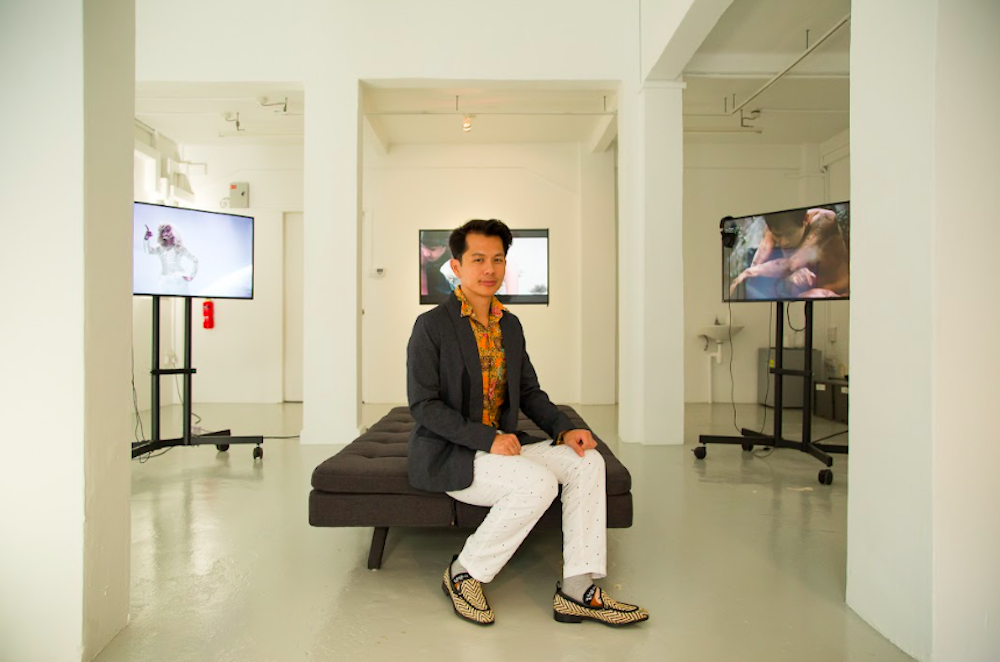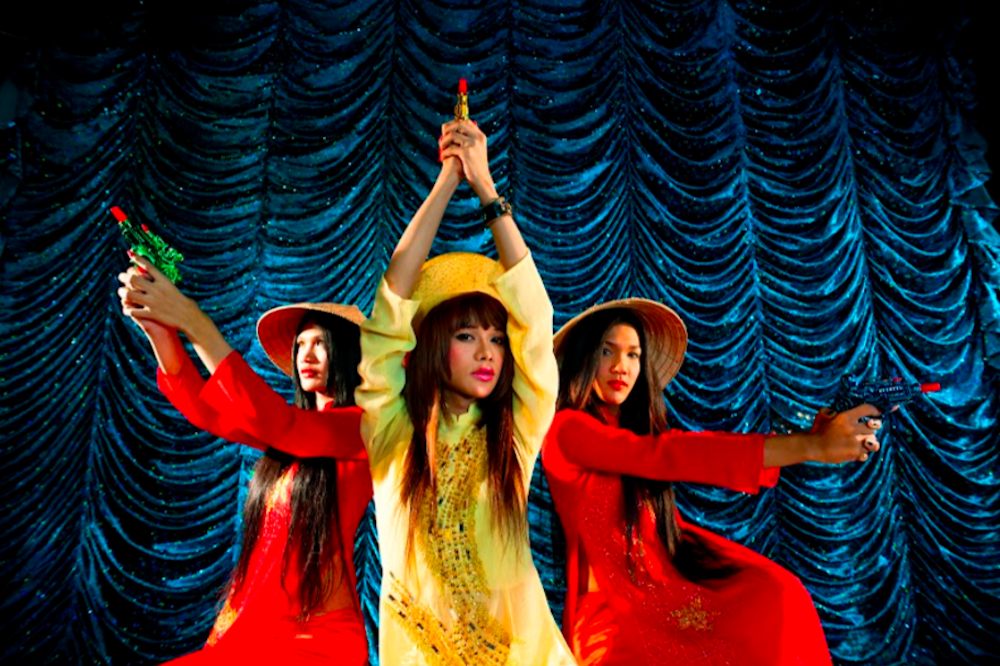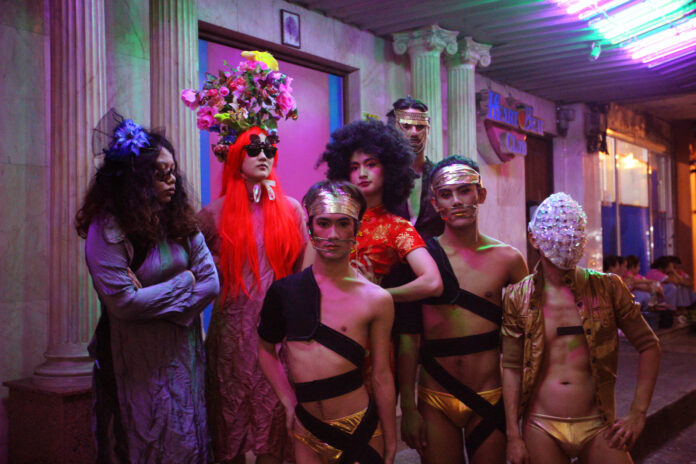Vietnam’s Mother Goddess ceremony—in which mediums entreat immortals to penetrate their bodies and load them with health and hope—is still mostly unheard of outside Southeast Asia. However, curiosity about the centuries-old tradition, which aims to bond communities and elevate the role of women, has increased since 2016, when UNESCO recognized it as an important cultural marker.
Like many religious practices, the ceremony has modernized with time and become more inclusive, capturing a wider audience worldwide. Richmond-based artist and Headlands Center for the Arts Bay Area fellow Việt Lê offers their own unique spin on the sacred ritual with their latest work, Mother | Goddess, Or, Việt Namaste: Queer Vietnamese Indigenous Shamanism (Sun/3, Headlands Center for the Arts).
Presented by Headlands in tandem with the artist’s Shifting Possessions salon series at 500 Capp Street and trầnsfiguration exhibition at / slash art), the “spiritual drag show” centers queer ritual in Southeast Asia and abroad, an interest Lê began exploring as a 2022 Mellon CCSRE Arts Fellow at Stanford in a project highlighting queer and transgender spirit mediums and visionaries in Cao Đài, Vietnam’s third-largest religion. They eventually expanded their focus to include the Mother Goddess religion—the basis of their work at Headlands and 2024 solo show at Sàn Art in Sài Gòn.

Mother | Goddess, Or, Việt Namaste will also feature surprise performers, a panel discussion led by Lê, Hà Nội shaman-priest Bin Vương, and USC professor of anthropology Janet Hoskins, as well as a dinner conceived by Lê and Headlands chef Damon Little.
I spoke to Lê about the multifaceted presentation, how their experience as a Vietnamese boat refugee continues to shape their artistic purpose, and how their shows connect their audiences to their own innate intuition and power.
48HILLS What inspired you to create the show Mother | Goddess, Or, Việt Namaste?
VIỆT LÊ This convenience/conjuring arose from my artistic and academic interest in learning about different forms of healing and joy in times of crisis.
For me, it is a lighthearted, reverent, spiritual “coming out” party in the United States as a shaman/priest seeking communal wisdom and a celebration moving beyond irrelevant dualisms toward empowerment.
Help us save local journalism!
Every tax-deductible donation helps us grow to cover the issues that mean the most to our community. Become a 48 Hills Hero and support the only daily progressive news source in the Bay Area.
48HILLS How has your journey as a queer and disabled Vietnamese boat refugee influenced the creation and development of this show?
VIỆT LÊ My performance and second half of life question is: Is illness an initiation? How are spirituality and sexuality connected?
The different mediums I use—whether a show, music video, performance, curated exhibition, art book, or academic book—are couched in relatively simple Derridean aporias.
The first half of my life was [about] reconciling the differences between traumas. Now that I’m on the verge of 48, a possibly auspicious number, my core concerns are around the keywords “spirituality” and “sexuality.”
As a child boat refugee, I did not understand nor fully comprehend why I was on a boat for almost two weeks with no food or water, sexually assaulted at a refugee camp, and subject to racial and homophobic torment. [The experience has guided me] toward reframing our understandings of pain, poisons, and power.
48HILLS Can you elaborate on the rituals, symbols, or elements from Vietnamese Indigenous shamanism that you incorporate into your performance and their significance?
VIỆT LÊ Đạo Mẫu—or Mother Goddess—is among the oldest Indigenous Vietnamese religions, which some have argued date back thousands of years. Most recently, it was recognized by UNESCO in 2016 as an Intangible Cultural Heritage of Humanity.
For me, it is about embodied, direct connections with divinity, forms of knowing—and knowing one’s own power. We all embody the divine in its multiple aspects. I call this ritual a form of “spiritual drag,” as the six- to eight-hour-long original rituals contain 28-plus costume changes, blessings, traditional musicians, singers, and dancers.
48HILLS Could you share some insights into the intersections between queerness and Vietnamese Indigenous spiritual practices depicted in your show?
VIỆT LÊ During my PhD research, which started 15 years ago under professor Janet Hoskins, who will be joining us from the University of Southern California, I learned that not only in Southeast Asian shamanistic practices, such as Mother Goddess, but in other cultures, as professor Roberto Strongman writes about in Queering Black Atlantic Religions, there are a large number of queer spirit mediums, as the spirit world knows no spatial-temporal bounds nor gender.

48HILLS How does your performance challenge or subvert traditional perceptions of gender, identity, and spirituality within the Vietnamese cultural framework? How do you balance cultural authenticity and artistic reinterpretation when portraying Vietnamese Indigenous spiritual practices through a contemporary lens?
VIỆT LÊ Vietnamese traditional and contemporary cultural practices have been experimental and fluid throughout time. Many religious studies scholars have written about gender, modernity, and this particular religion, and the popularity of such practices. I don’t necessarily believe in a divide between authenticity and artistic interpretation, but that it is one that is shifting: Mediums are also an artistic medium.
48HILLS In what ways does your work aim to bridge understanding and dialogue between different cultural and spiritual practices?
VIỆT LÊ At the core, my artistic, territorial, and academic work is about forging creative, critical, and spiritual-spatial connections via centering BIPOC/Global South healing wisdom. I found that through my healing journey, which has lasted over 20 years and several surgeries and debilitating illnesses, many powerful healers (including medical practitioners, researchers, cultural workers, and holistic healers) can further amplify access to their own powers and traditions—and many artists are also visionaries.
In the long run, I would like to start or collaborate on a foundation, which would forge connections between spiritual, academic, artistic, and religious healing wisdoms.
Ultimately, a center—which would be the hub of artistic, academic, and spiritual connections through conferences, workshops, exhibitions, knowledge production, Southeast Asian cultural infrastructural support, and cultural and diplomatic exchange.
48HILLS What do you hope audiences take away from experiencing Mother | Goddess, Or, Việt Namaste?
VIỆT LÊ My intention is for audience members to be more keenly in touch with their own forms of (intuitive) knowing and power—and if they are already, to share the love.
I may often use my subjectivity as a starting point or case study, but it is really a starting point to think about empathy, engagement, and change.
MOTHER | GODDESS, OR, VIỆT NAMASTE: QUEER VIETNAMESE INDIGENOUS SHAMANISM Sun/3, Headlands Center for the Arts, Sausalito. $40-$50. Tickets and more info here.
Note: A free shuttle from SF to Headlands will be available by reservation. To reserve a spot, please contact info@headlands.org.




